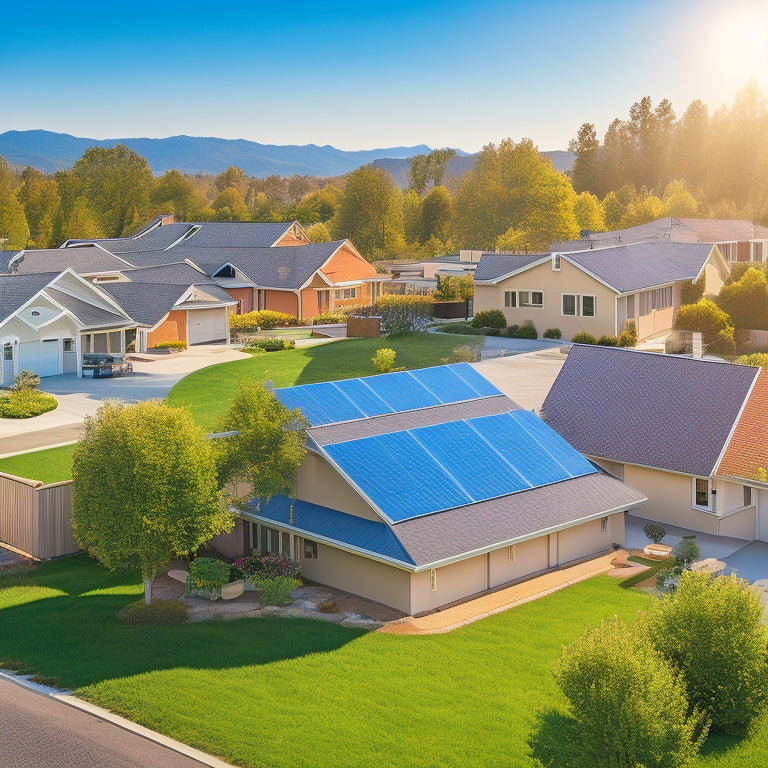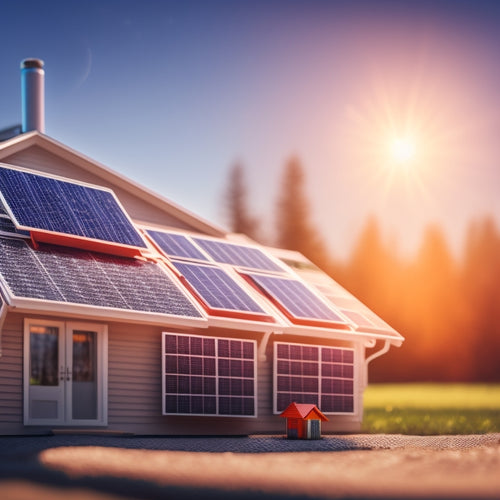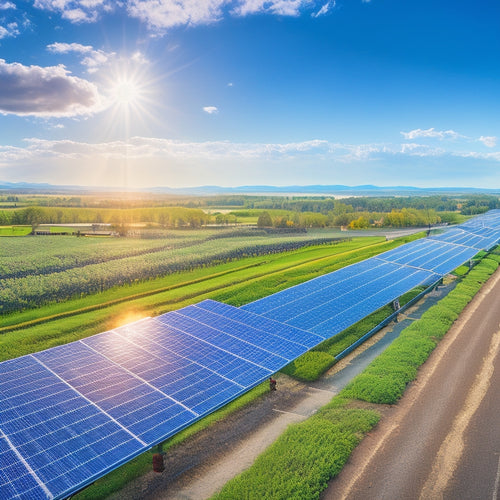
What Are the Best Solar Panel Systems for You?
Share
You're looking for the best solar panel system that meets your unique energy needs and budget. Top brands like Renogy, HQST, and WindyNation offer high-efficiency systems and innovative solutions. When shopping online, consider retailers like Amazon, Home Depot, and Lowe's for competitive pricing and expert support. Don't forget to research off-grid battery options, system configurations, and prices to make sure you find the perfect fit. As you explore your options, keep in mind that proper system sizing, panel orientation, and battery maintenance are essential for peak performance. Now, discover which system is right for you.
Key Takeaways
• Consider top brands like Renogy, HQST, and WindyNation for high-efficiency and innovative solar panels.
• Choose a reputable online retailer like Amazon, Home Depot, or Lowe's for competitive pricing and expert customer support.
• Select a suitable solar panel system configuration (grid-tied, off-grid, or hybrid) based on your energy needs, budget, and location.
• Prioritize deep cycle batteries with long cycle life and durability for reliable energy storage, and consider LFP batteries for longer cycle life.
• Compare prices and kits from different sellers, considering factors like warranty, shipping, and return policies to find the best system for your needs.
Top Off Grid Solar Panel Brands
When going off the grid, selecting a reliable solar panel brand is vital, and you'll want to explore top performers like Renogy, HQST, and WindyNation. These brands have established themselves as leaders in solar innovation, offering high-quality products that guarantee maximum energy output.
Renogy, for instance, is known for its monocrystalline solar panels, which boast impressive efficiency rates. HQST, on the other hand, offers a range of solar panel kits that cater to different energy needs. WindyNation, meanwhile, focuses on delivering affordable, high-performance solar panels that won't break the bank.
When choosing a solar panel brand, it's important to take into account factors like durability, warranty, and customer support. You want a brand that stands behind its products and provides reliable after-sales service. Brand loyalty is key in the solar industry, and these top brands have earned their reputation through consistent innovation and customer satisfaction.
Online Retailers for Solar Systems
You can find a wide range of solar panel systems and accessories from online retailers like Amazon, Home Depot, and Lowe's, which offer competitive pricing, convenient shipping, and often, expert customer support. These retailers provide a one-stop shopping experience, allowing you to compare products, read reviews, and make informed purchasing decisions.
When shopping online, it's crucial to take into account shipping options, as timely delivery can impact your project timeline. Look for retailers that offer expedited shipping, real-time tracking, and flexible delivery schedules. Additionally, be sure to review return policies, in case you need to exchange or return items. Reputable retailers will have a clear return policy, with minimal restocking fees and hassle-free returns.
Best Off Grid Battery Options
When you're building an off-grid solar system, choosing the right battery is essential. You'll want to explore deep cycle options that can handle the demands of your system, and understand how to maintain them to ensure peak performance.
Deep Cycle Options
Choosing deep cycle batteries specifically designed for off-grid systems guarantees a reliable and efficient energy storage solution, as they can withstand the demands of frequent charging and discharging. When selecting a deep cycle battery, you should prioritize cycle life and battery durability. A longer cycle life means the battery can handle more charge and discharge cycles, making it a more cost-effective option in the long run.
| Battery Type | Cycle Life |
|---|---|
| Flooded Lead-Acid | 300-500 cycles |
| AGM (Absorbed Glass Mat) | 500-800 cycles |
| LFP (Lithium Iron Phosphate) | 2,000-3,000 cycles |
As shown in the table, LFP batteries have a notably longer cycle life compared to traditional lead-acid batteries. This makes them a popular choice for off-grid systems. When evaluating deep cycle batteries, consider the manufacturer's warranty, maintenance requirements, and overall cost. By choosing a high-quality deep cycle battery, you can ensure a reliable and efficient energy storage solution for your off-grid system.
Battery Maintenance Tips
Proper maintenance is essential to extending the lifespan of your deep cycle battery, and a well-planned regimen can help prevent premature degradation and guarantee peak performance.
As you invest in your off-grid solar panel system, you'll want to make sure your battery health remains at its best. To achieve this, you'll need to monitor your charging cycles, keeping track of how many times your battery is fully discharged and recharged. Aim to keep your charging cycles between 300 to 500, depending on the manufacturer's recommendations.
Regularly check your battery's state of charge, and avoid deep discharging, which can reduce its lifespan. You should also maintain a consistent charging routine, avoiding irregular or incomplete charging cycles.
Additionally, ensure your battery is stored in a cool, dry place, away from direct sunlight and extreme temperatures. By following these tips, you'll be able to maximize your battery's longevity, ensuring your off-grid solar panel system operates efficiently and effectively.
Solar Panel System Configurations
You'll typically encounter three main solar panel system configurations: grid-tied, off-grid, and hybrid systems, each with its unique characteristics and applications. When choosing a system, consider your energy needs, budget, and location. Grid-tied systems are ideal for areas with a stable grid connection, while off-grid systems are perfect for remote locations. Hybrid systems offer the best of both worlds, providing backup power during outages.
Here's a breakdown of each configuration:
| System Type | Grid Connection | Backup Power |
|---|---|---|
| Grid-Tied | Required | No |
| Off-Grid | Not Required | Yes |
| Hybrid | Required | Yes |
When designing your system, consider system sizing and panel orientation to maximize energy production. Proper system sizing ensures you generate enough energy to meet your needs, while ideal panel orientation (between 15° and 40°) maximizes energy output. By understanding the different system configurations and design considerations, you'll be well on your way to harnessing the power of solar energy.
Off Grid Solar Panel Prices Compared
When evaluating off-grid solar panel systems, understanding the price differences between various options is important to determining the overall cost-effectiveness of your investment. Prices can vary greatly depending on the type and quality of equipment, installation costs, and local incentives.
For instance, a high-efficiency system with advanced inverters and monitoring systems can cost upwards of $3.50 per watt, while a more basic system might come in at around $2.50 per watt.
You should also consider the concept of Grid Parity, where the cost of generating electricity through solar power is equal to or cheaper than traditional grid power. This is especially vital for off-grid systems, where energy independence is key.
However, Price Volatility in the solar market can make it challenging to predict costs. To mitigate this, it's important to research and compare prices from different manufacturers and installers to find the best value for your money.
Features to Consider for Off Grid
Your off-grid solar panel system's performance and reliability hinge on several key features that you should carefully consider before making a purchase. Achieving grid independence and energy autonomy requires careful planning and attention to detail.
As you evaluate different systems, look for high-efficiency solar panels with durable frames and weather-resistant connectors. A high-capacity battery bank with a reliable charge controller is also vital for storing excess energy generated during the day.
Additionally, consider the inverter's efficiency and surge capacity to guarantee seamless power conversion. A monitoring system with real-time data tracking and alerts can also help you optimize your system's performance and identify potential issues.
Off Grid Solar Panel Reviews Online
When conducting research on off-grid solar panel systems, it's crucial to separate fact from fiction, debunking common solar myths that may be holding you back from embracing green living.
By scrutinizing reviews from reputable sources, you can gain valuable insights into a system's performance, reliability, and overall customer satisfaction. Look for reviews that offer detailed information on the system's energy output, durability, and maintenance requirements to make an informed decision about the best off-grid solar panel system for your needs.
Additionally, take note of the warranty and customer support provided by the manufacturer. A reputable brand will back its product, giving you peace of mind and safeguarding your investment.
Investing in a high-quality system won't only benefit the environment but also deliver long-term energy savings and independence.
Top Rated Off Grid Solar Kits
As you explore top-rated off-grid solar kits, you'll want to focus on the essentials that guarantee a reliable and efficient system.
That's why we've compiled a detailed kit comparison guide, breaking down the key components and features that set top-performing systems apart.
Off Grid Essentials
When venturing off the grid, a reliable solar panel system is essential, which is why investing in a top-rated off-grid solar kit can be a game-changer for your independence and self-sufficiency.
As you shift to an off-grid lifestyle, you'll want a system that can efficiently harvest and store energy to power your rural homestead. A high-quality off-grid solar kit should include high-efficiency solar panels, a robust charge controller, and a reliable deep-cycle battery bank. These components work in harmony to provide a consistent flow of energy, even on cloudy days or during extended periods of low sunlight.
With a well-designed off-grid solar kit, you'll enjoy the freedom to live life on your own terms, without relying on public utilities. Whether you're building a rural homestead or simply seeking energy independence, a top-rated off-grid solar kit is an essential investment for your off-grid lifestyle.
Kit Comparison Guide
You'll want to carefully evaluate the top-rated off-grid solar kits on the market, comparing their components, features, and performance to find the best fit for your unique energy needs and budget. A thorough kit comparison guide can help you make an informed decision.
When evaluating kit design, consider the type and quality of solar panels, charge controllers, inverters, and batteries. Look for kits with optimized system integration, guaranteeing seamless communication between components. This will secure efficient energy harvesting and storage.
Top-rated kits often feature advanced system integration, allowing for real-time monitoring and smart control. Some kits may include additional features like built-in grounding systems or pre-wired connections for easier installation.
Compare the warranties, certifications, and customer support offered by each manufacturer. By weighing these factors, you'll be able to pinpoint the best off-grid solar kit for your specific requirements and budget.
DIY Off Grid Solar Panel Kits
Take control of your renewable energy goals with a DIY off-grid solar panel kit, a cost-effective and efficient way to harness the sun's power in remote locations. These kits provide a flexible solution for those who want to generate their own electricity, away from the grid. You'll appreciate the reduced upfront costs and increased solar ROI, making your investment more viable.
When choosing a DIY kit, consider the panel aesthetics, ensuring they blend seamlessly into your surroundings. Look for kits with high-efficiency panels, durable mounting systems, and reliable inverters. Many DIY kits come with pre-wired panels, making installation easier and faster.
With a DIY off-grid solar panel kit, you'll enjoy energy independence and lower your carbon footprint. Before making a purchase, research the kit's compatibility with your energy needs and local building codes. By doing so, you'll be well on your way to harnessing the sun's power and reaping the benefits of renewable energy.
Buying Off Grid Solar Panels Online
Purchasing off-grid solar panels online requires careful consideration of factors such as shipping costs, warranty coverage, and customer support to guarantee a hassle-free experience. When you're shopping online, it's important to research the seller's return policies, in case you need to send back defective or incorrect items. Look for sellers that offer a clear, important return process and a reasonable timeframe for returns.
Additionally, consider the shipping costs and estimated delivery time. You'll want to make sure that the panels arrive safely and on time. Be wary of sellers with unclear or vague shipping policies, as this can lead to unexpected costs or delays.
When buying online, you'll also want to verify the seller's warranty coverage. A reputable seller should offer a detailed warranty that covers defects and malfunctions. Moreover, look for sellers that provide dedicated customer support, preferably with a phone number, email, or live chat. This will ensure you can get help quickly if you encounter any issues with your off-grid solar panels.
Frequently Asked Questions
Can I Install Solar Panels on a Metal or Clay Tiled Roof?
You can install solar panels on a metal or clay tiled roof, ensuring roof compatibility and weather resistance by selecting suitable mounting systems and flashings that accommodate your roof type and local building codes.
Do I Need a Building Permit for an Off-Grid Solar System?
When installing an off-grid solar system, you'll need to check local regulations and zoning laws to determine if a building permit is required, ensuring code compliance and undergoing an inspection process to meet permit requirements.
Can I Add More Panels to My System in the Future?
As you ponder expanding your solar footprint, rest assured you can add more panels to your system in the future, facilitating seamless system expansion and energy upgrades, ensuring your renewable energy setup stays future-proof.
How Do I Clean and Maintain My Solar Panels?
You'll maintain peak panel efficiency by regularly cleaning your solar panels, as dust accumulation reduces energy output; use a soft-bristled brush, mild soap, and distilled water to gently remove debris and guarantee maximum energy harvesting.
Are Off-Grid Solar Systems Suitable for Remote Areas With No Grid Access?
You'll find off-grid solar systems ideal for remote areas with no grid access, enabling rural electrification and energy autonomy, as they can operate independently, providing reliable power and independence from the grid.
Related Posts
-

How to Achieve a Zero-Waste Lifestyle for a Greener Tomorrow
To achieve a zero-waste lifestyle, start by adopting the principles of refusing, reducing, reusing, and recycling. Sw...
-

A Beginner's Guide to Navigating the Solar Investment Tax Credit
You're eligible to claim a significant Solar Investment Tax Credit (ITC) of 30% of total installation costs, but mane...
-

Applications of Photovoltaic Systems
Photovoltaic systems are versatile, converting sunlight into electricity for various applications. You can use them i...


